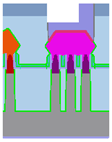Phỏng vấn CEO với Tiến sĩ Dennis Michaelis của GEMESYS
Key Takeaways
- GEMESYS is a tech start-up focused on AI hardware, utilizing an analog chip architecture with memristive functionality for energy-efficient, real-time neural network processing on edge devices.
- The company addresses significant industry challenges such as high energy consumption in AI model training and focuses on data privacy, enabling local training and execution of AI models.
- GEMESYS targets application areas that prioritize energy efficiency and real-time performance, including consumer electronics, automotive, healthcare, and industrial IoT, distinguishing itself from competitors with its innovative technology.

Dr. Dennis Michaelis is the founder and CEO of the AI chip start-up. With a Ph.D. in Bio-Inspired Computing at the Purdue University in Indiana and a background in electrical engineering, he brings a unique blend of technical expertise and social commitment to the company. His previous role as Regional Director for Anonymous for the Voiceless highlights his leadership skills and dedication to ethical causes, as he was responsible for over 100 local groups in DACH, each with hundreds of members.
His professional expertise is underpinned by a large number of scholarships, his Cum Laude dissertation and the award of the “VDE Prize for Outstanding Academic Achievement” from the German Association for Electrical, Electronic & Information Technologies (VDE) for his Master’s thesis.
Tell us about your company?
GEMESYS is a cutting-edge technology company based in Bochum, Germany, focused on revolutionizing AI hardware. We’ve developed a novel analog chip architecture using memristive functionality, which enables ultra-efficient, real-time neural network processing directly on edge devices.
Our technology is designed to address some of the biggest challenges in the industry, like energy efficiency, performance at the edge, and data privacy. By processing AI workloads natively in hardware, we achieve dramatically lower power consumption and latency compared to traditional digital solutions. This makes our chips ideal for applications in industries like consumer electronics, automotive, healthcare, and IoT.
We’re backed by a strong combination of investors from Europe (Amadeus APEX Technology Fund, Atlantic Labs, NRW.Bank), Silicon Valley (Plug and Play Tech Center), and Japan (Sony Innovation Fund), and have recently secured an $9.1M pre-seed round, including government support. At our core, GEMESYS is about creating intuitive, sustainable technology that simplifies and enhances everyday life. Our vision is to lead the shift toward smarter, more connected edge devices, enabling our customers to innovate faster and more effectively.
What problems are you solving?
At the moment, training a single complex AI model, such as ChatGPT, consumes as much electricity as a coal-fired power plant produces. This is also reflected in the huge data centers that are constantly in operation. If this trend continues, the cost of training a single neural network could exceed the economic power of entire countries as early as 2026. GEMESYS is developing a new type of hardware solution for decentralized AI applications. At its heart is an analog AI chip that is modeled on the human brain and processes data directly at the source, the so-called edge devices. For the first time, this enables local training of AI models in addition to the local execution of AI, which reduces network loads, improves data protection and promotes scalability. Thanks to its analog approach, the GEMESYS chip offers unparalleled energy efficiency and opens up new possibilities for Internet of Things applications and the networking of numerous devices.
What application areas are your strongest?
Our technology is particularly strong in application areas where energy efficiency, real-time performance, and data privacy are critical. In consumer electronics, for instance, our chips power wearables and smart home devices, enabling real-time AI processing without draining batteries.
In automotive, we support advanced driver-assistance systems and autonomous vehicles, delivering low-latency AI capabilities that enhance safety and performance while meeting strict energy and reliability demands.
In healthcare, our chips enable portable medical devices and diagnostics tools to process data securely on-device, ensuring privacy and reliability, especially in remote environments.
We’re also making a significant impact in industrial IoT, powering factory automation, predictive maintenance, and edge monitoring systems where energy efficiency and local decision-making are essential.
Finally, in smart cities, our technology supports applications like environmental monitoring, reducing cloud dependency while providing fast, localized AI.
These diverse areas highlight how GEMESYS is driving smarter, more sustainable edge solutions across multiple industries.
What keeps your customers up at night?
Many of them are kept up at night by the need to achieve more with less—delivering high-performance AI capabilities while staying within strict power and cost constraints. For those working on edge devices, power efficiency is critical, especially for battery-powered applications where every milliwatt counts. They also need real-time AI processing without relying on cloud connectivity, which introduces latency, security risks, and compliance challenges.
Beyond that, cost pressures are a constant concern. Scaling AI capabilities while managing manufacturing costs and maintaining competitive pricing is a balancing act. Add to that the growing focus on sustainability—companies are under immense pressure to reduce their carbon footprints and meet ESG goals. AI solutions that aren’t energy-efficient simply won’t align with these priorities.
What does the competitive landscape look like and how do you differentiate?
On one side, we face established players in the semiconductor and AI hardware space, that focus on both inferencing and training of AI models in data centers such as NVIDIA, Qualcomm, and Intel. On the other, a wave of emerging startups is exploring alternative approaches like spiking neural networks or crossbar-arrays to enable inferencing on the edge.
What sets GEMESYS apart is our fundamentally different approach. Most competitors are focused on squeezing incremental gains from digital architectures that were never designed for the inherent demands of AI at the edge. These architectures struggle with energy efficiency and latency while relying heavily on cloud processing.
At GEMESYS, we’re rewriting the rules with our analog chip architecture, leveraging memristive functionality to process neural networks natively in hardware. This allows us to achieve ultra-low power consumption and real-time performance—ideal for edge devices. While many competitors are optimizing traditional solutions, we’re offering a breakthrough technology that aligns perfectly with the industry’s future needs for energy-efficient, scalable, and secure AI processing.
What new features/technology are you working on?
While our core technology—an analog chip architecture with memristive functionality—already sets us apart, we’re working on several advancements to further enhance its capabilities.
One key area of focus is expanding the adaptability of our architecture to support more diverse AI models and applications. This involves optimizing our chips to handle increasingly complex neural networks while maintaining the same ultra-low power and high-speed performance that define our technology.
We’re also developing features that improve on-device learning. Traditionally, AI models are trained in the cloud and then deployed to devices, but this approach has limitations in dynamic environments. With on-device learning, our chips can adapt to new data in real-time (continuous learning), opening up possibilities for smarter, more personalized edge devices.
Another exciting development is in the area of robust and secure AI. As data privacy becomes an ever-greater concern, we’re enhancing our architecture to ensure secure, local data processing without compromising performance. This is especially critical in industries like healthcare, automotive, and industrial IoT.
Finally, we’re exploring ways to integrate our chips into broader ecosystems, ensuring seamless compatibility with existing software frameworks and enabling end-to-end solutions for our customers. These advancements reflect our commitment to not only delivering cutting-edge hardware but also enabling our customers to stay ahead in an increasingly connected and intelligent world.
How do customers normally engage with your company?
We design and develop cutting-edge analog chips with memristive functionality, which we license to device manufacturers and system integrators. This licensing model allows us to scale efficiently, enabling our customers to integrate our technology into their products across industries like consumer electronics, automotive, healthcare, and industrial IoT.
Additionally, we generate revenue by providing tailored solutions and support for our first pilot customers, including co-development partnerships for custom applications and optimization services. This ensures our technology meets the specific needs of our customers’ use cases while also fostering long-term collaboration.
Also Read:
CEO Interview: Slava Libman of FTD Solutions
CEO Interview: Caroline Guillaume of TrustInSoft
CEO Interview: Mikko Utriainen of Chipmetrics
Share this post via:


